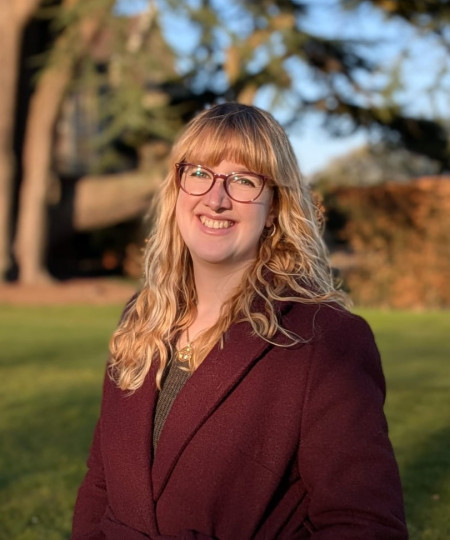
Dr Christine Plastow
Senior Lecturer In Classical Studies
Biography
Professional biography
I discovered Classics during A Levels: coming from a state school, I didn't know Greek and Latin were still a thing, but when at sixth form college I was offered the chance of something 'like history but better', I took it. One of the first texts I read was Lysias 1, which I've returned to often ever since. I studied English Literature and Classical Studies as an undergraduate at Royal Holloway, University of London, then moved to the University of Bristol for a Masters in Classics and Ancient History. I then moved to University College London, where I wrote my PhD thesis on ‘Athenian Homicide Rhetoric in Context’ under the supervision of Professor Chris Carey, and also undertook an exchange placement at Yale University to work with Professor Victor Bers. While at UCL, I worked as a teaching assistant in Greek and Latin, and a tutor in the UCL Writing Lab. I completed my PhD in February 2017, and joined the Open University in September 2017 as a Lecturer in Classical Studies. I was promoted to Senior Lecturer in 2024.
Research interests
I have two main areas of research interest. The first focuses on Greek oratory, primarily on Athenian forensic oratory from rhetorical, legal, and social-historical perspectives. My book Homicide in the Attic Orators: Rhetoric, Ideology, and Context, published by Routledge in 2020, examines the distinctive role of homicide in Athenian law and culture, and explored how this distinctiveness played out in rhetoric in four pertinent areas: Athenian ideology, religious pollution, relevance, and the twin issues of motivation and intent.
One aspect that arose from this study was the importance of location in defining appropriate content for rhetoric; interesting distinctions could be seen between homicide rhetoric delivered in the homicide courts, and that delivered in the popular courts. This observation informed my ongoing interests in space and place in Attic forensic oratory, combining a social historical approach with methodologies from the spatial turn in the humanities, cognitive science, and human geography. The project is ongoing in the form of a number of conference papers and publications.
More generally, I am interested in the importance of viewing works of Athenian oratory not as texts but as speeches, with an emphasis on the act, moment, and location of delivery, and the influence these can have on the original audience’s and our own understanding of their content. For me, the speeches are most interesting for what they say about Athenian cultural beliefs and social history; I am particularly interested in cultural norms and deviations from them, ideals vs reality, and questions of how Athenians perceived themselves and the world around them and were perceived by others.
My second area of interest is in practice-as-research work in the contemporary theatrical reception of Greek myth, for which see below under 'Impact and engagement'.
I am the Director of the Creative Interactions research group, and a member of Open Ecologies and GOTH (Gender and Otherness in the Humanities).
Teaching interests
I have previously taught on several OU Classical studies modules: A276 Latin, A229 Exploring the classical world, and A350 Greek and Roman myth: stories and histories (for which I was also deputy chair in production), as well as the MA in Classical Studies. I wrote the OpenLearn unit Introducing Homer's Iliad, and authored materials on Athens for the Classical Studies section of the interdisciplinary Level 1 module A112 Cultures, and on myth in Athens for A350. Our animated retelling of Medea for A350 was nominated for a Royal Television Society Yorkshire award! I'm currently the chair for production of Part 1 of the new MA in Classical Studies, which will be available for the first time in September 2024; I'm also authoring material on what it means to do classical studies in the 21st century and on ancient literature and the natural environment. I'm also the Qualification Lead for Classical Studies, taking a broad view across the whole curriculum. I'm keen to see ancient Greek language re-enter the Open University curriculum, and have enjoyed teaching the language at all levels: I'm particularly proud of our work on the OpenLearn course Getting started on ancient Greek, which is freely available to study.
Impact and engagement
I am the co-Artistic Director and a long-time member of Theatre of the Gentle Furies (previously known as By Jove Theatre Company), a London-based performance collective producing new work from old stories. In 2021 we produced The Gentlest Work, a queer myth in pieces: a digital installation exploring queerness, trauma, and joy in the myths surrounding the Oresteia through performance, poetry, and art. The project was funded by Arts Council England, the Hellenic Society, the Institute of Classical Studies, SCS Classics Everywhere, and the Louis M. Rabinowitz Foundation. I have also previous organised poetry events around women in the Homeric poems and the motif of weaving in women's stories with the Gentle Furies. We are now beginning a new impact project, Mythic Storytelling and the Changing Environment, exploring the potential for using myth in performance to help people today reorient their relationship with the natural world in a time of climate emergency. The project is part of the Open Societal Challenges portfolio.
Publications
Book
Female Agency in the Ancient Mediterranean World (2024)
Greek Tragedy, Education, and Theatre Practices in the UK Classics Ecology (2024)
Citizenship in Antiquity: Civic Communities in the Ancient Mediterranean (2023)
Homicide in the Attic Orators: Rhetoric, Ideology, and Context (2020)
Book Chapter
Introducing the Classics Ecology (2024)
Towards Co-creation: Roles of Classics Academics in Modern Productions of Greek Tragedy (2024)
Places of citizenship in Athenian forensic oratory (2023)
Citizenship in antiquity: current perspectives and challenges (2023)
The Devil's in the Detail: Including 'irrelevant' details in homicide narratives. (2019)
Space, place, and identity in Antiphon 'On the Murder of Herodes' (2019)
Digital Artefact
Staff-Student partnerships in pedagogy and research-based education: lessons for Classics (2018)